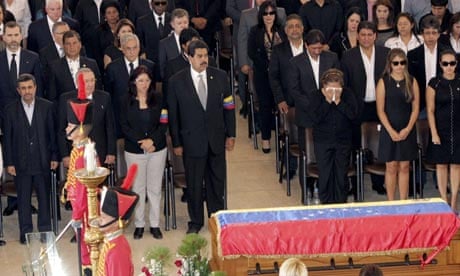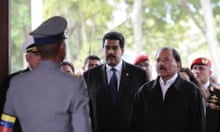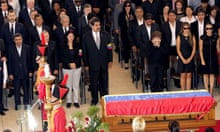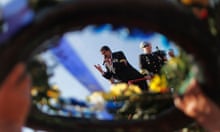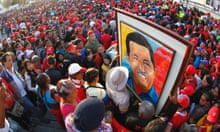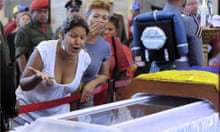Back in 2007, Hugo Chávez created a unique time zone, ordering Venezuela's clocks back half an hour, but on Friday his heirs improvised a funeral like no other to stop the clocks and immortalise the comandante eternal.
Dozens of presidents, prime ministers and princes from around the world joined hundreds of thousands of pilgrims at the military academy in Caracas to bid farewell to a leader who simultaneously inspired, enchanted and repelled during his 14-year rule.
They came not to bury but enshrine him, for the funeral was a prelude to an indeterminate period of lying in state before Chávez's body is embalmed and displayed in perpetuity at the Museum of the Revolution.
"We have decided to prepare the body … so that it remains open for eternity for the people. Just like Ho Chi Minh. Just like Lenin. Just like Mao Zedong," said Nicolás Maduro, the vice-president who was due to be sworn in as president at sunset after the ceremony. Maduro is widely expected to win a six-year term in an election due to be held within 30 days.
A hush fell across Venezuela, where bars and beaches have been closed for official mourning, as Cuba's Raúl Castro, Iran's Mahmoud Ahmadinejad, Bolivia's Evo Morales and about 30 other heads of state and government filed into the academy's chapel. The US sent a small, mid-ranking delegation. Ambassador Catherine Nettleton represented Britain.
Crowds lining the route cheered Chávez's mother Elena as she arrived, weeping. The Simón Bolívar youth orchestra, conducted by Gustavo Dudamel, performed a soft version of the national anthem.
"My all has left me. Goodbye my giant," tweeted Chávez's daughter Maria Gabriella, a regular companion at his public events. She helped rally support for his return to power after he was briefly ousted in a 2002 coup.
All eyes rested on the wooden coffin draped in Venezuela's flag. Before it was closed, some 2 million people, by the government's count, had queued for a glimpse of him, dressed in military uniform and red beret. He was announced dead on Tuesday, aged 58, after a two-year battle with cancer.
A band played lively folk music from the plains, songs that Chávez often sang himself during his near-daily television appearances. Maduro placed a replica of the sword of Simón Bolívar, the 19th-century liberator Chávez revered, on the coffin. Upon taking the podium, Maduro cried and proclaimed undying loyalty to his comandante. "No volveran!" he chanted. They will not return! A vow the opposition would not regain power.
"We have lost a great friend," said Ahmadinejad. "I have the feeling I have lost myself … Chávez will never die." He compared the late president to Jesus Christ.
Venezuela, pre-Chávez known largely for oil and beauty queens, has been stunned at the global reaction, with several countries declaring days of official mourning in solidarity. Elías Jaua, foreign minister, said: "This is like having the world united thanks to Chávez."
Red-shirted supporters, baking in the sun, repeated what have become mantras: Somos todos Chávez – We are all Chávez. Chávez vive en nosotros" – Chavez lives in us. Others coined a new slogan: Chávez did not die, he multiplied!
"I was 10 years old when he took power. He was our comandante, our father," said Giancarlos Mendoza, 24, who joined a convoy of red red buses ferrying mourners to Caracas for the funeral.
Franklin Roosevelt and Georges Pompidou died in office but the example Chávistas hope to emulate was the name on a big white banner near the chapel entrance, Juan Perón, who died in 1973 and remains decades later a talisman for Argentina's ruling Perónists.
Maduro – whose opponent is expected to be Henrique Capriles in the forthcoming election – will try to harness the passion of the millions who revered his charismatic, mercurial chief. He has taken to mimicking Chávez's vocabulary and gestures and planted the notion of the eternal comandante, never to be betrayed, in quasi-religious tones.
Venezuela's cardinal, Jorge Urosa Savino, no friend of Chávez, is in Rome for the conclave. Monsignor, Mario Moronta, as well as pastor Alexis Romero Valera and US civil rights leader the Reverend Jesse Jackson officiated at the mass.
Time is the government's friend and foe. Chávez's body, according to some forensic specialists, has probably decayed too much for embalming, not least because of his coffin's seven-hour crawl on Wednesday to the military academy in sweltering temperatures.
The Spanish paper ABC reported it was empty and that the real coffin was transported on a quieter, different route to avoid the crowds, a Fellini-esque theory in keeping with a week in which the government accused unnamed "enemies" – aka the US – of murdering Chávez by poisoning him with cancerous agents.
The Museum of the Revolution, which is to be his final resting place remains unfinished – a symbol, murmured critics, their voices still low amid febrile emotions, of the revolution's inability to build or maintain infrastructure.
Placing the president in the museum will violate his expressed desire to be buried in the plains of his youth but will give his movement a politically powerful shrine in the heart of the capital.
Chávez revealed that he was suffering from cancer in June 2011. Its nature remained a secret and he insisted last year he was cured, giving a marathon nine-hour speech to convince voters the miracle was real. They gave him another six-year term in last October's election.
He was dying, but the government maintained the fiction up until the end, with ministers simulating lengthy cabinet meetings at the bedside of a mute, suffering, fading patient.
Even so, his death on Tuesday caught them flat-footed and they scrambled to organise the funeral. Until Thursday night there was confusion over its time and location. In the end they decided to hold it where he was lying in state.
The fact he was not going to be buried or cremated and would remain in situ after the ceremony ended put a question mark over whether it was really a funeral or, as Argentina's Cristina Fernandez put it, after leaving Caracas on Thursday, more a "protocol event". A friend and ally of Chávez, she said doctors warned her the heat would be bad for her health.
The improvised air was in keeping with the late president's spontaneous and at times capricious governing style. As well as changing the clocks, he altered the country's name, flag and coat of arms, the latter at the suggestion of his then eight-year-old daughter who suggested the horse should face left, not right.
Supporters loved the showmanship but they appreciated even more the generous spending of oil revenues on social programmes, subsidies and handouts that helped halve poverty and reduce inequality. "He gave me a house. I have every reason to be grateful. It changed my life," said Tamara Rondon, 33, part of the ocean of red paying homage at the academy.
Others said their support was rooted not in the fridges, televisions and cookers the government gave out before elections but in Chávez's extraordinary ability to connect with the poor, even after years in the presidential palace. "He was one of us," said taxi driver Claudio Sembrano.Such was his political genius he evaded blame for inflation, shortages, power cuts and collapse in security – 59 murders a day last year, according to the Venezuelan Violence Observatory, the worst in South America - which torments the barrios. Dozens of the latest casualties lay on slabs in a hillside morgue not far from Friday's ceremony.
Rather than be sworn in at the national assembly Maduro chose to take the sash at the military academy, blending funeral and inauguration.
